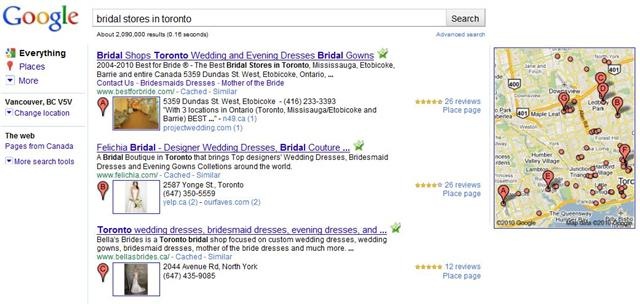Google Local was first introduced to us in 2004. Back when the movie Sideways tarnished the reputation of Merlot forever and the founders of Google become billionaires after the company went public.
Google decided to capitalize on the fact that every day millions of people were performing searches that involved a specific location, like "london barbers" and "new york hotels". Thus spawning Google Local. It offered relevant neighborhood business listings, maps and directions. When Google Maps was later introduced into the Googlesphere in 2005, Google Local was eventually paired with Google Maps.
Google Places
In April of last year, Google Local changed its name to Google Places. It launched an impressive 50 million business places listings around the world last year. And crazy enough, at that time only 4 million businesses had claimed their listing.
As of last week, Google Places can also be found in Place Search. This means that Google Places search results will appear in regular Google search results (which they always did, just more information will be included now).
If you own a business there is a decent chance that you're already listed in Google Places - even if you've done nothing about it. What you must do - if you want to rank at all locally - is claim your listing. Research shows that a high number of people search online prior to making a decision. So the bottom line is if you want your business to make money, you need an online presence (marketing 101 my friend).
Sign up for Google Places here.
I've claimed my listing, now what?
There are several things you can do once you claim your listing.
- Optimize your website with local terms and relevant keyword phrases.
- Get backlinks to your site with relevant anchor text. Preferably anchor text that contains the local term within it. Like "London Tea Shop".
- Build up citations in local directories. Ones that are specific to your city/town/state/province make great citations. (Note: a citation is basically a listing that has your address and/or phone number like Yellow Pages.)
- Encourage reviews. People showing interest in your business is pretty dang important.
- Produce relevant content that outlines your products, services and geographical area
Is that it?
In a nutshell. Be warned: although the above list sounds short and sweet it can actually consume hours, weeks and even months. Because Google Places listings now show up in regular search results (for search queries that involve a specific location), all of the rules of search engine optimization apply to getting ranked. Like any other search result, getting your Google Places listing to show up in Google Place Search results is the result of a mathematical algorithm (which is a combination of factors to determine which search result most effectively answers a searcher's query.)
So what are you waiting for? You have plenty of work to do!


